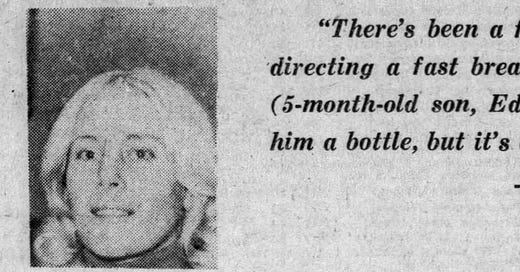NEW ORLEANS — The landmark Title IX decision celebrates its 50th anniversary this year, an occasion shared with the golden anniversary of one of college basketball’s greatest teams winning a national championship.
No, it’s not one of John Wooden’s UCLA squads — although reporters of the day drew comparisons between the men’s coaching legend and Immaculata leader Catherine Rush.
Like Wooden, Rush won repeat national championships and nurtured the careers of some of the sport’s all-time greatest. But comparisons between the two are not entirely fair — John Wooden never managed practice while also feeding a baby, as far as I know.
Via an April 1973 profile in the Philadelphia Inquirer:
Now, if you’d never heard of Cathy Rush or Immaculata basketball, you’re not alone. I myself just learned about its dominance in the 1970s this weekend while covering the Final Four.
Here in New Orleans, the Naismith Basketball Hall of Fame Class of 2022 met with reporters, and it’s a remarkable group that includes Bob Huggins, Del Harris, Tim Hardaway and 21st Century women’s basketball luminaries Swin Cash and Lindsay Whalen.
Seated at the center of the dais were two other women, one of whom I knew, albeit for her current role as head coach of the Indiana Fever, Marianne Stanley. Next to her was a women with whom I was not familiar prior to Saturday’s introductory press conference. She mentioned she was college teammates with Stanley.
My interest was piqued. Not often are two members of the same college team Hall of Famers. Then she mentioned that their coach, Cathy Rush, was inducted in 2007.
What’s more, their entire team was inducted in 2014.
That woman is Theresa Grentz nee Shank, and she was a baller. She averaged 20.2 points on 53.2 percent shooting for her Immaculata career and grabbed 16.6 rebounds.
If Rush was Wooden, Grentz was her Bill Walton.
Digging through archives at the endlessly valuable site Newspapers.com revealed some remarkable feats — like how then still Shank sealed Immaculata’s first national championship in 1972 after a 20-minute delay.
The confidence Rush describes in the above Philadelphia Daily News article was evident at the Hall of Fame press conference. While Stanley deferred attention for her individual induction after having been part of the team inducted in 2014 — “As an ex-point guard, I’m about the assists,” Stanley quipped — Grentz jokingly interjected that she loved the accolades.
“Passer,” she said pointing to Stanley, then pointed to herself: “Scorer.”
The dynamic worked. Immaculata became women’s college basketball’s first dynasty, winning each of the first three national championships of the Association for Intercollegiate Athletics for Women. The AIAW was the forerunner to women’s sports under the NCAA umbrella as part of Title IX.
Immaculata won championships from 1972 through 1974, setting the bar for programs like Tennessee under Pat Summitt and UConn under Geno Auriemma.
Thirty years after Immaculata’s first title, UConn cruised to a national championship with a team that Auriemma once said was his best ever. Lindsay Whalen said at Saturday’s press conference that watching the 2001-02 Huskies, she believed they were the greatest team she’d ever seen — but Whalen quickly added that Grentz and Stanley “might have something to say about that.”
Whether or not they were better, the Immaculata teams were undeniably important to elevating the stage for women’s basketball long after their college days. Both went into coaching, with Grentz heading up the U.S. National Team amid a successful tenure at Rutgers, while Stanley led Old Dominion to one of the first Women’s NCAA championships.
“You’re trying to do your best each and every day to impact the game in the ways that you can,” Stanley said. “For me, that was coaching.”
Both women credited Rush for her influence.
And while debates about greatest ever are futile do to the evolution through eras, one thing can be said in Rush’s favor when compared to Auriemma: The latter never coached a national championship-winning team while six months pregnant, as Rush did in 1974.





